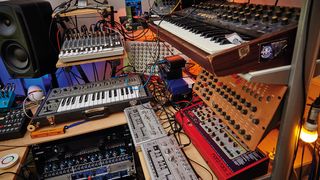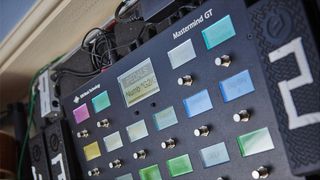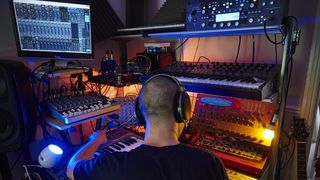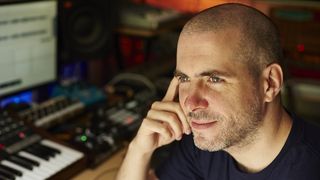Despite releasing two well-received Dubstep-influenced albums, Phaeleh (pronounced ‘Fella’) struggled to conform to consumer expectations, the rigidity of club-focussed music and a record label dispute that resulted in a two-year sabbatical.
Upon his return, he took the courageous step to release two fully immersive ambient albums, Somnus (2014) and the critically acclaimed Illusions of the Tale (2016).
Now, Preston is able to return to beat-based music from a different vantage point with his latest downbeat release, Lost Time. In keeping with his desire to move forward by referencing the past, Preston has remodelled his sound using vintage synth hardware and a rekindled love for live instrumentation.
Phaeleh sounds more like a Greek god, so how did it come to be pronounced ‘Fella’?
But when I showed my mate my fancy new MySpace page, he said, ‘That’s great, but how do you pronounce it?’ And I just thought… ‘Shit’.
“Keen eyes you’ve got there, because you’ve actually touched upon something that’s part of the name. I did it to get a MySpace page and – sad as it sounds – I’d tried to find a word that had zero results on Google at the time. You mention the Greek stuff… well, the ‘a’ and the ‘e’ was the first part. I did classics at school and loved all the words with those letters in.
“But when I showed my mate my fancy new MySpace page, he said, ‘That’s great, but how do you pronounce it?’ And I just thought… ‘Shit’.”
Why do you think Bristol has such an active and diverse electronic scene?
“Similar to London, going back a few years you had an amazing mix of cultures and backgrounds. I meet people who are pure scientists about sound, and others with a band background. It just seems like a very open-minded city and probably still is, as I’m less directly involved with those around me now.
"At the time I wanted to move to Bristol, a lot of people told me I could do my music more seriously in London, and I could see the advantages, but Bristol was an affordable place where you could meet like minded creative types. Not to sound too hippy, but it has a really positive energy.”
It’s pleasing to read you were influenced by Making Bones by a Bristol band called Red Snapper, which is a highly underrated album…
“I’ve done music for as long as I can remember, traditionally through the band route, then I was very much into old LTJ Bukem, Good Looking Records and Moving Shadow on the drum & bass side of things, but that didn’t factor into my productions.
For me, those two albums made me realise that music’s just music; it didn’t have to be exclusively routed in one sound, and you could mix up live instrumentation with electronics. That got me into taking production seriously, rather than doing it as something to kill time.
“One day, someone gave me a tape of Making Bones and some breakbeat-era stuff. So I had these albums, which were dance-based electronic albums, and I realised that I was hearing all the instruments I played, but there was also beats, MCs, singers, bass and guitar.
"For me, those two albums made me realise that music’s just music; it didn’t have to be exclusively routed in one sound, and you could mix up live instrumentation with electronics. That got me into taking production seriously, rather than doing it as something to kill time.”
Where does your interest in the cinematic and ambient side of music derive from?
“I’ve always been into a bit of everything, with an emphasis on the melodic stuff. So I loved a lot of stuff like Kruder & Dorfmeister, and Aphex Twin’s Selected Ambient Works was probably the biggest influence on me, so I’ve always had a soft spot for the more chilled stuff. I used to make club-based music and play drum & bass out at parties, but as I’ve got older, I prefer to create music that helps you switch off from the chaos of life. Even with my heavy stuff, if you mute the bass and drums, there’s still layers of subtle pads and field recordings, but more recently I’ve turned the background noise up and toned down the rest.”
In terms of marketing yourself, was it a difficult transition?
“I won’t pretend that I dealt well with the transition from music being fun to it being my job – everywhere you look on the internet you’ve got people complaining about one thing or another. They don’t mean anything by it, but I put a lot of pressure on myself with the beat-based music. With every song you make, you’re thinking, ‘Is it good enough for the album or as good as my old releases?’ Rather than it being a natural and enjoyable process, it became a burden.
“At some point I just thought, screw what might be the best career move, I’m going to just sit down and make an ambient album because I enjoy it. Music should be enjoyable at the end of the day, and now I’ve come back to beat-based music it feels a little bit more genuine – I’m not just making what I think I should be making.”
Was the creative approach an entirely new one?
“With a lot of electronic music, you work in this loop format, which is great, but it’s so easy to get sucked into creating music in sections, where you make the verse, then the drop, then the breakdown – it’s very calculated. With the ambient stuff, it’s more about capturing a performance and a mood rather than articulating ideas with a mouse. It felt more like being a musician to me.”
The beats are back for the new album Lost Time. Did you revert to type compositionally, or do certain principles still remain from your adventures in ambient?
“I think the new album is a bit of a mixture of both. It’s not the newest material; it was made during a big creative period between 2014 and 2016. Normally I’d go in and spend hours tweaking things or flicking through sounds on a synth I’ve made – sounds that I know work from other tunes, but this time a lot of the finishing touches were about me firing up the Roland SH-101 and recording some synth arpeggios and getting a live recording from start to finish. There’s a lot of background noise on it, not the usual hiss I’d spend hours trying to get rid of in iZotope RX.
When I was younger, there were no rules, and making this album has made me realise I want to get back to doing that.
"For me, it’s been quite a learning experience. It’s made me aware of how I want to approach the next album, going back to the days of walking into a studio that has racks of synths and outboard and running a recorder through an MS-20 or some weird envelope. When I was younger, there were no rules, and making this album has made me realise I want to get back to doing that.”
Do the beats come first, with you overlapping ambient-sounding arrangements?
“I’ve never had set rules, although there’s certain methods I might use. Traditionally, I’d say I usually start with harmonic and melodic elements before the beats. Often I’ll lay down some chord parts or a couple of synths riffs to a click track and then make the beat, which is probably backwards. But a lot of my favourite songs will start with me firing up my knackered and temperamental Korg Mono/Poly, leaning on it and something going crazy inside.
"Then I’ll get stuff recorded in audio rather than tweaking a softsynth or existing sounds. Sound design is very important to me, but I’ve been trying to get back into capturing things in real time, which leads to more imperfections but just seems to resonate with me.”

You’re classically trained. Why has it taken so long to get that element into the music?
“I took classical guitar to grade eight, and I’m probably a better guitarist than a producer, but it got a little bit boring for me. In the past, a lot of the musical ideas and motifs were probably disguised or processed, so people thought they were just a sample.
“A lot of my bigger tracks are based around guitar, but they were processed through reverb and modulation – now it’s a bit more rough and raw. I remember the first feedback I got from a Bristol producer who asked me what synth I used for a certain part when it was just harmonics on a guitar going through a hell of a lot of reverb. I’ll set up a pedal train with absurd signal routes.

"I don’t know if you know RJM? It’s an American company that make MIDI foot controllers, but they give you a lot of in-depth control. You can play live and manipulate all these weird sends on the reverbs and delays while dropping loopers down to half-speed. It’s incredibly simplistic, and I wouldn’t call those tracks proper classical pieces, because they have a dance structure – so I’ll loop parts and build them up.”
Do you feel that recording live instruments makes post-production a little more simplistic?
“Yes, to a certain extent. I’m not really recording dry sounds in; I tend to split my signals so the dry and the wet signals are separate in case I need to re-amp or re-record a synth or guitar. In terms of creative post-production, there’s less of it, but I probably shouldn’t admit the fact that even after I get the masters backs I’ll still go and edit those versions. Now, I’m told by yourself and other magazines that you should never do that, but I hear sounds that come out that bother me.

“In terms of making the music and mixing, that doesn’t take very long, so creatively speaking the notion that physicality makes music a lot more interesting and is behind my return to hardware is true for guitars as well. I’ve switched from a pedal board to the Kemper Profiler, made by the Virus guys, and I love it, but because I’m flicking through menus to edit the effects, I’m lacking that creative spark which you get from playing with loads of pedals in front of you.”
It’s interesting that you felt it necessary to change the master recording, as that’s not something we typically hear from producers.
“It’s a weird one, but most of the engineers I know don’t like attended mastering sessions – unless you’re a new client. With the new album, I think we did five different versions of certain tracks. He’d send it back and I’d tweak a snare drum, but it wasn’t necessarily a case of him not having mastered it how I like it – his master just showed me flaws in my production. I don’t know if that’s on me for being slack or whether it’s because I’m trying to mix down tracks after I’ve flown across the Atlantic four times in two weeks. I’ll do my home masters using Ozone or pump them through a Voxengo Elephant mastering limiter, and those things sound great, but when you send your stuff to a proper mastering place, certain elements come out more than you realise.”

What synths did you use to generate the sounds on this latest release?
“The favourite of my current setup is probably the Roland SH-101. With that synth you can literally hit some random notes into the sequencer, stick on some reverb and you’ve got your most played track on Spotify. Not that I’m admitting it’s just random sequences, but that synth just fits with everything, whether you’re making a garage banger, something cool, or ripping off Selected Ambient Works.
"That and the Prophet-6 are probably my most-used synths. I love the Prophet; I think it sounds great, although part of me still wishes I’d got a Dave Smith OB-6. The oldest synth I’ve got that’s still working is the Waldorf XP, which I got in 2002 when I was at university. I don’t use that a lot, but I tend to use it for weird digital noises and effects or the occasional pad.”
Are you still using the Korg Mony/Poly that you mentioned?
“It’s in awful condition, but I’ll still use it for dready, Reesey basses. In my mind, that machine is probably the most analogue in my studio in the sense that it’s an untameable beast. I’ve also got a Yamaha DX100, which was used on a few releases but not that much now. I normally have to use an editor on my laptop to really get into it.
"There’s a Nord Rack 2, which I mostly use for little swooshes and noises. I’ve been getting back into that recently for a lot of the new music I’m making, because I quite like having these mono ’90s pads and putting them through a Valhalla reverb plugin or a Strymon BigSky.”

Are you a synth fanatic, always on the lookout for inspiring hardware synths, past or present?
“I’m one of those people that would happily have more. Space is the main issue, but I’m slightly put off by the fact that while a Juno sounds great, every man and his dog in Bristol or Berlin that I knew during the post-dubstep scene had to buy a Juno. That’s why I wouldn’t want one.
“I lust after synths, like the new Oberheim SEM Two Voice Pro. I’ve been trying so hard not to buy one of those, but it’s ridiculously expensive. I’ve got a lot of kit as it is, and whilst I love it all, the question remains, could I be using it more? I could sit down and make an album with just the Waldorf, the Nord or the SH-101.
"The last thing I bought would have been the Prophet-6, about 18 months ago, and that filled a very specific need in that I wanted a hands-on analogue pad machine, although it’s not as in-depth as some of my other synths.”
In your opinion, do people rinse enough out of their hardware synths?
You should see the stuff Richard Devine does! It’s incredible, but my concern is that I’ll spend a week making insane patches, which doesn’t help you get a release out, keep your audience happy or help you book tours.
“I could go into the Waldorf and have a thousand envelopes looping round and triggering LFOs – the possibilities are insane… and then I look at the Prophet and it’s only got one LFO. It’s inherently flawed in its modulation capacity, but it sounds incredible and surprises me every day.
"Sometimes you can learn the way an LFO works and how different waveforms affect things, so although I know my synths, I still don’t think I’ve exploited even 10% of what they’re capable of.
“I’ve opened myself up to modular recently, mainly from looking at the Two Voice Pro, and think I could integrate it with a couple of clock dividers – so I can’t rule that out, but it would be a quick way to bankrupt myself.
"You should see the stuff Richard Devine does! It’s incredible, but my concern is that I’ll spend a week making insane patches, which doesn’t help you get a release out, keep your audience happy or help you book tours.”
You’re a Cubase fan, we understand?
“I’m Cubase till I die, and I’ve been using it for 21 years now. I learnt it at school when it was called Cubasis and was just MIDI. They brought in some audio with AV at some point; then you had Cubase VST when they started throwing in the instruments.
When you get creative blocks, it’s very easy to think a new synth will help, or a new drum machine, EQ or compressor, and sometimes people do that with DAWs, but I’ve never had any issues with Cubase so I’ve never wanted to change.
"Don’t get me wrong, I know people who make great music in every DAW on the planet, so whatever suits you is fine, but I’m just better and faster at MIDI and audio editing on Cubase.
"When you get creative blocks, it’s very easy to think a new synth will help, or a new drum machine, EQ or compressor, and sometimes people do that with DAWs, but I’ve never had any issues with Cubase so I’ve never wanted to change. I’m quite proficient at using Ableton from when I use it for live stuff and collaboration, but Cubase has the simplicity of use and the depth.
“If people ask me what they should use when they’re starting out, I’d tell them Ableton Live. If you sit in a room and watch someone using Cubase, you’re going to get confused – although I couldn’t make my music in Live.”
Do you find yourself having to upgrade your PC or Mac as the DAW upgrades?
“I haven’t upgraded beyond Cubase 8, because the jump from 7.5 to 8 caused me a few issues with my computer, so I stopped updating. It’s about five years old now, so best not tempt fate [laughs]. I have an old PC which is running an ancient version, and sometimes I might want to take certain tracks out or use them for live performance and I can’t. But it’s not really Cubase that’s the problem, it’s more the VSTs – a lot of my old stuff was done on an old version of Battery that won’t open in Battery 3.
“My music machine isn’t on the internet, it’s got Ableton, Sound Forge, Cubase, Resonic, Mixed In Key, which is an old version that doesn’t need to go online, iZotope RX, and iZotope Ozone – I think that’s probably all the software on there.”
What’s behind your choice of VSTs and plugins?
“Although I’ve definitely gone more hardware again in recent years, I still love Alchemy – it’s my favourite softsynth and that still works, although Camel Audio was sadly sold to Apple.
"Software-wise, it probably says a lot about my productions that the two things I use the most are iZotope RX, for cleaning clicks and noises, and Melodyne – I love playing with that and moving stuff around or fixing subtle things. I’ve got free stuff like Dexed or Diva, which I use for side projects and is great for cheesy house stabs or acid tunes that don’t get released but everyone tells me is much better than my normal stuff.
"Oberheim’s OP-X is probably the best-sounding soft synth I own in terms of subtractive synthesis. I’m a big fan of the Lounge Lizard plugin and I’ve got Serum, but I don’t think I’ve ever used that. I’ve found that I’ve shifted a lot more to using my Kontakt libraries – the Soniccouture stuff and Cinematique Instruments.”
Do you supplement your hardware synths with softsynth effects or layers?
“The Rob Papen stuff’s kind of cool; I use that for layering on top of other sounds. If I’m using the Prophet for chords, sometimes I’ll do different inversions of the chord progression using the Waldorf XT or BLUE or Predator, just so there’s a little extra texture. I might just take the high-end of one and the low end of another and do some multiband processing so the panning frequencies and modulations are different.”
You once said that you tend not to look at live audiences because you misread people zoning out as looking bored. Does that exemplify the insecurity that many artists go through that people don’t realise?
People would describe my music as blissed-out, for example, and live they just get lost and are standing on the spot. If their eyes were closed, I thought they’d fallen asleep and took that as them not enjoying it.
“A lot of it comes down to an individual’s personality, and I’m a bit of a delicate flower sometimes. Music are my babies, I don’t really do anything else in life. The usual things that people might go home to, I come home to synths and carry on making more music. People would describe my music as blissed-out, for example, and live they just get lost and are standing on the spot. If their eyes were closed, I thought they’d fallen asleep and took that as them not enjoying it. But I don’t think audiences are as energetic as they were 20 years ago.
"I’ve seen rock bands where you’d have walked out there with a black eye having being kicked in the face several times; these days the kids are standing there with a phone. But I’ll not look at the audience – I’ve got to trust the fact they’re paying to listen to me play my music. Maybe if I trusted myself and my creations more, it wouldn’t be an issue.”
Phaeleh’s gone back to beats for his new album Lost Time, which is available now. Check out his official website for more information.




